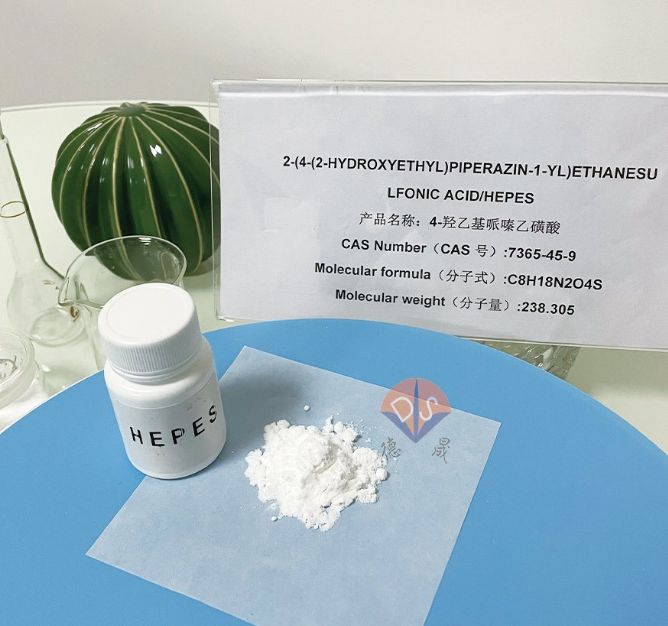Exploring the core application value of HEPES in cell culture and tissue engineering
Release time:
2025-06-12
In the field of cell culture and tissue engineering, the success of experiments often relies on accurate control of details. Among them, the pH stability of the cultivation environment is one of the key factors determining cell health, proliferation ability, and even the reliability of experimental results. HEPES buffer(4- (2-hydroxyethyl) -1-piperazine ethanesulfonic acid) has become the primary choice for researchers due to its excellent pH regulation ability and biological effects. This article will delve into the core application value of HEPES in cell culture and tissue engineering, revealing how it provides solid support for life science research.

HEPES powder
PH stability maintenance
Traditional cell culture typically relies on a CO ₂ - bicarbonate buffer system to maintain the pH of the culture medium, but this system requires high stability of the CO ₂ concentration in the incubator. In certain scenarios, such as primary cell culture, neural cell experiments, or high-throughput screening, frequent opening and closing of the incubator or lack of CO ₂ environment may lead to drastic pH fluctuations, directly affecting the cell state.
The emergence of HEPES effectively solved this problem. Its pH range is 7.0-7.6, which highly matches the physiological pH range. It can stabilize the pH of the culture medium in the ideal range by neutralizing acidic or alkaline substances (such as lactic acid, ammonia, etc.) produced by cell metabolism without relying on CO ₂. Research has shown that using a culture medium containing 10-25 mM HEPES, pH fluctuations can still be controlled within ± 0.1 even after operating in an open environment for several hours.
Inhibit cell adhesion
Cell adhesion is a natural phenomenon during the cultivation process, but in certain experimental steps such as cell passaging, flow cytometry, or microscopic observation, excessive adhesion may reduce operational efficiency. The special feature of HEPES is that the sulfonic acid groups in its molecular structure can slightly interfere with the interaction between cell surface integrins and matrix proteins, thereby temporarily inhibiting cell adhesion. It should be noted that the anti attachment effect of HEPES is concentration dependent and reversible, and usually does not affect the long-term viability of cells, providing flexible space for experimental design.
Induction of lysosomal biogenesis
In recent years, another breakthrough application of HEPES in cell biology has been discovered - it can specifically activate MiT/TFE family transcription factors (including TFEB and TFE3), thereby promoting the expression of genes related to lysosomal biogenesis. Lysosomes, as the "recycling station" of cells, are closely related to dozens of genetic diseases such as Gaucher's disease, Nieman Pick's disease, and lysosomal storage disorders due to their functional defects. The HEPES induced lysosome production mechanism provides a new tool for research. It is worth noting that the lysosomal activation effect of HEPES is not related to its buffering function, but is achieved by altering the intracellular pH gradient, suggesting that it may have a wider potential for signal regulation waiting to be explored.
Precautions for use
Despite the significant advantages of HEPES, it is still important to note in practical applications:
1. Concentration selection: Conventional culture recommends 10-25 mM, and excessive concentrations (>50 mM) may cause cytotoxicity;
2. Compatibility with CO ₂ system: HEPES and bicarbonate can synergistically buffer in a 5% CO ₂ environment, but the culture medium formula needs to be re optimized;
3. Metal ion chelation: HEPES may bind divalent ions such as Zn ² ⁺ and Cu ² ⁺, and corresponding components need to be supplemented in trace element sensitivity experiments.

Product packaging
Hubei Xindesheng Material Technology Co., Ltd., as a professional domestic supplier of biological buffering agents, has always been committed to providing high-purity, high stability, batch indistinguishable HEPES and other biochemical reagents for scientific researchers. We not only provide reliable products, but also offer professional technical support to explore more possibilities in life sciences with you.
News
Contact details
Contact number
Address: C8, Guanggu United Science and Technology City, Ezhou City, Hubei Province
Fax:0711-3704 589
Follow us



